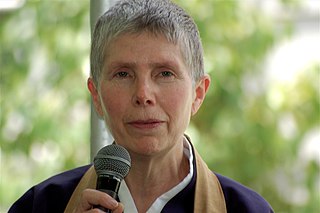A Quote by Jon Kabat-Zinn
Concentration is a cornerstone of mindfulness practice. Your mindfulness will only be as robust as the capacity of your mind to be calm and stable. Without calmness, the mirror of mindfulness will have an agitated and choppy surface and will not be able to reflect things with any accuracy.
Related Quotes
I have seen that there are a number of people who benefit from doing loving kindness meditation, either prior to or along with mindfulness meditation. It varies from person to person of course, but for many, their practice of mindfulness will bring along old habits of self-judgment and ruthless criticism, so it is not actually mindfulness.
You are a Buddha, and so is everyone else. I didn't make that up. It was the Buddha himself who said so. He said that all beings had the potential to become awakened. To practice walking meditation is to practice living in mindfulness. Mindfulness and enlightenment are one. Enlightenment leads to mindfulness and mindfulness leads to enlightenment.
The Buhha was a monastic, but the practice of mindfulness in the context of any lifestyle is one of renunciation. Every moment of mindfulness renounces the reflexive, self-protecting response of the mind in favor of clear and balanced understanding. In the light of the wisdom that comes from balanced undertanding, attachment to having things be other than what they ar falls away.
Your anger is like a flower. In the beginning you may not understand the nature of your anger, or why it has come up. But if you know how to embrace it with the energy of mindfulness, it will begin to open. You may be sitting, following your breathing, or you may be practicing walking meditation to generate the energy of mindfulness and embrace your anger. After ten or twenty minutes your anger will have to open herself to you, and suddenly, you will see the true nature of your anger. It may have arisen just because of a wrong perception or the lack of skillfulness.
If you want to know who you are, look into the true mirror. The flower will reflect your beauty. The sky will reflect your vastness. The ocean will reflect your depth. The child will reflect your innocence. But if you look into the mirror that is unconscious humanity, you are looking into the wrong mirror. Your reflection will be distorted by their projections.































